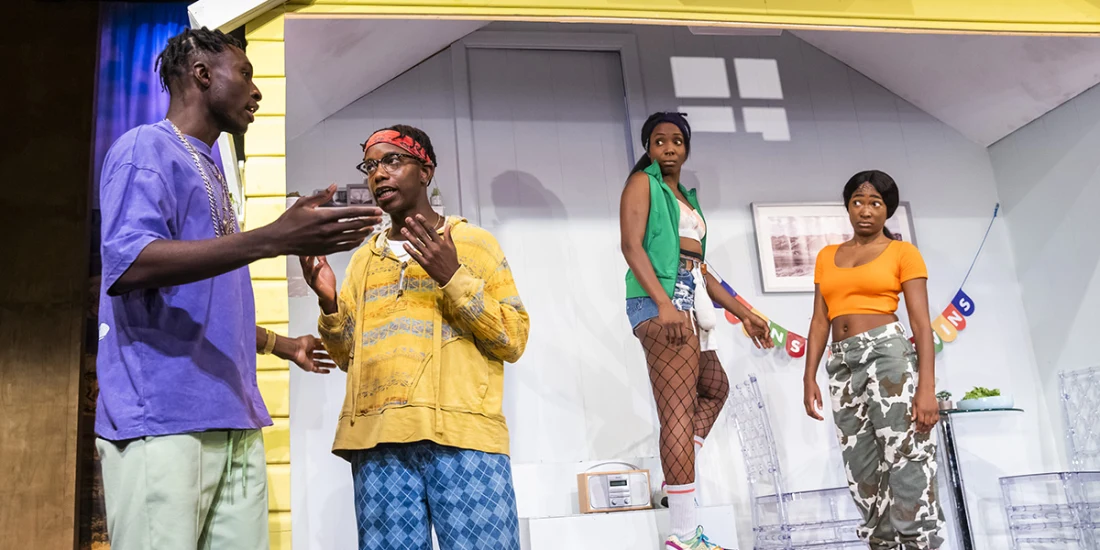'Is God Is' review - a fiery play that belongs to the here and now
God is a woman in Is God Is, the electrifying Aleshea Harris play that makes every bit as strong an impression on the Royal Court mainstage as it did off-Broadway at Soho Rep in 2018. (The explosive 90-minute work has also been optioned as a film.) Arriving as part of an exciting sequence of American female writers debuting works in London (Suzan-Lori Parks's White Noise and Bess Wohl's Camp Siegfried are both to come, while Paula Vogel's Indecent only just opened), Is God Is weds the sort of narrative picaresque more commonly seen onscreen with an appreciation of the furies roiling within humankind that date back to the Greeks. Harris shares an interest with her classical forbears in families torn murderously apart at the seams even as the energies of Ola Ince's unflinching production belong to the here and now.
The play amounts to a study in mission accomplished, after a fashion. Two twins, Anaia (Adelayo Adedayo) and Racine (Tamara Lawrance), are seen emerging from an onstage furnace before they are summoned to a "rest home for the weary" that happens to house their mother, known as She. As played by the great Cecilia Noble with the majesty of a dethroned queen who won't be toppled from her perch, She hasn't been in touch for most of her daughters' lives because the younger of the two, Anaia, tends to get emotional and She didn't want to upset her young children. Now, time has moved on, She is nearing the end, and a gauntlet is thrown down: could the daughters kill the same father who has scarred their mother with all-too-visible burns that have given She an alligator-like appearance?
"Kill his spirit, then the body," says She by way of whispered exhortation: the published script renders Harris's language with the lettering in different sizes, depending upon the import of what is being spoken. "You ain't nothin' now," Racine says near a brutal finish that finds the siblings travelling westward only to encounter their father's new family that comes with its own set of twins, this one teenage males, not to mention a wife, Angie, who oversteps the mark when she refers to Racine and Anaia's mum as "ghetto trashy". Racine is quick to exact reprisal, while a whimpering Anaia true to our earlier sense of her isn't so sure. "God don't want nothin but blood," says Racine by way of explanation in a play whose subtitle could just as well be "There Will Be Blood."
You can tick off the cultural references here, which range from Medea, Kill Bill and Afropunk to the lunatic bloodletting of Martin McDonagh, whose envenomed Mildred in Three Billboards Outside Ebbing, Missouri finds kindred spirits in two sisters overtaken by a bloodlust that looks destined never to be entirely satisfied. But Harris's great achievement is to navigate her way through passages of deceptive larkiness to tighten a figurative noose that, in this play, takes the actual form of a rock in a sock. The violence, in turn, is magnificently calibrated by the fight director, Philip d'Orleans, whose task includes escalating the response of an audience that needs to know when the laughter must freeze in the throat.
Extending her own influences to Rihanna in one direction and grand opera the next, Harris posits the sisters as a Thelma and Louise for an eternally barbaric society, and I wouldn't have been at all surprised either here or in New York had we at some point found the murder victims baked into some faux-delicacy or other, by way of Shakespeare or Sweeney Todd. The performances have the collective fire in the belly that is called for as they wend their way through various witty Chloe Lamford sets, each of which contains visual information aplenty to supplement the text. (The bedchamber for the dying She is especially evocative.) At times, a staginess takes over, and not all the cast is equally comfortable with the various accents and patois required: Vivienne Acheampong's ill-fated Angie sounds American to the core.
Adedayo and Lawrance make of the star parts fine and feisty foils both to one another and to civilization, if one can call it that, at large, and Noble seethes with a guttural, hissing fury that anchors the production in the defining terror it needs. The play goes heavy on the carnage if not on a sense of respite achieved along the way. "Funny, I still hear noise," says Anaia, who wonders aloud whether her family might be cursed. It's to the credit of Is God Is that playgoers are likely to hear this remarkable play in their heads for some while to come.
Is God Is is at the Royal Court to 23 October. Book Is God Is tickets on LondonTheatre.co.uk.
Photo credit: Is God Is (Photo by Tristram Kenton)
Originally published on
